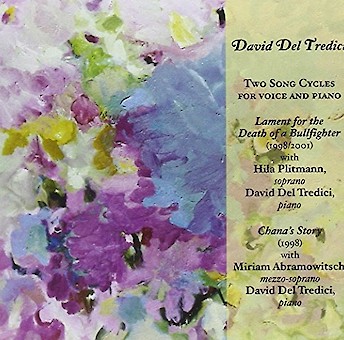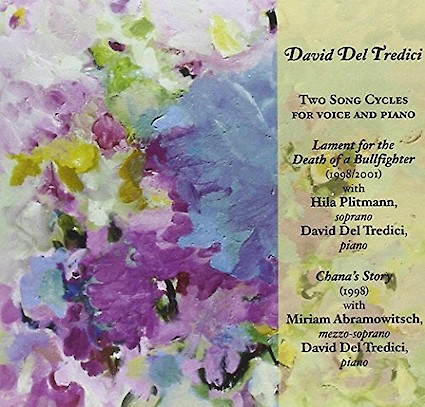David Del Tredici writes: "Like Schumann's Frauenliebe und Leben, the six songs of Chana's Story chronicle a tale of love, told from the woman's point of view. As well, both cycles share a descent from ecstasy to loss. While the Schumann cycle ends in desolation and the death of the male beloved, Chana's Story concludes in sadness, separation and—hope. The final songs suggests renewal and transcendence for the woman.
"The Fever of Love" is fast and ecstatic. The text is startlingly vivid in its description of the male body by the love-besotted woman. "Eating Babies", a quieter kind of ecstasy, acknowledges the sensual dimension in loving, caring for and nursing one's own newborn infant. Not surprisingly, the song half-way through metamorphoses into a lullaby. "Tired Sex" begins the couple's downward slide. The song, somewhat baroque in feeling with framing ritornelli, is lightly humorous. "The Stutter" is a chilly picture of family dysfunction. Frustrated parents focus on their now stuttering, angry child. The song is fast and full of furious trills. The stuttering I-I-I setting in the opening verse returns at the end transformed into a flowingly expressive line, as though the child had, magically, lost his stutter and could speak fluently.
"Clear and Cold", a still more turbulent song, is full of bitterness. The woman recalls her own father's death, counterpoised with her present dying relationship. Memories of early passion surface but are soon submerged by the weight of gloomy reality. At the end of the setting the persistent triplet rhythm in the piano falters. At that point I introduce the poem's last couplet: 'I sat at my father's bedside/ and watched him fall.' Especially elaborated upon is the final word 'fall.'
This leads without pause into the concluding "Alone on the Mountain" — a slow, measured song of rebirth and transformation. The woman has had the courage to leave the relationship, to begin again, to ascend the mountain 'to lose size, anger, the sticky burrs of wanting.' Gradually the stately, climbing pace quickens, as the mood becomes rapturous. The woman senses relief, a burden lifted. A new path has opened. A glowing coda repeats over and over the words 'to feel—to feel again.' The first five songs of Chana's Story were written in nine days at Yaddo, the artist's retreat in Saratoga Springs, New York.
Here it was that I first met Chana Bloch, read her poetry and delighted in playing her my settings. Alone on the Mountain was written two years later as a conclusion to the cycle.
Chana's Story was commissioned for Miriam Abramowitsch by Marie Damrell Gallo 'in loving memory of Bernhard Abramowitsch, a great teacher, pianist and friend.' Bernhard Abramowitsch was, as well, my own most important musical mentor. The work is dedicated to Miriam Abramowitsch."
"This is a remarkable accomplishment and should find a secure place in the vocal repertoire (for sopranos who can cut it, that is).
"Del Tredici himself cites Frauenliebe und Leben as a model for Chana's Story (1998), a searing cycle dealing with the devastating loss of a relationship, but there's a life-affirming ending. More intensely dramatic (and pantingly erotic) than the preceding cycle, this piece demonstrates the composer's huge emotional range in this genre.
"Del Tredici, who has been churning out songs in profusion of late, has without question established himself as one of the great song composer of our time. If you care about song literature, you cannot miss this release."
"... the work that made the greatest impact, David Del Tredici's new song cycle "Chana's Story," written for East Bay mezzo Miriam Abramowitsch, a student with Del Tredici in the early '60s. Del Tredici played the piano part."A father of the now-dominant New Romanticism with his "Final Alice" in 1975, Del Tredici, 61, continues to mine the same vein with this song cycle. It is marked by a marvelously fluid, pictorial, almost symphonic piano accompaniment and a devilishly difficult vocal. The terse,sensual texts of Chana Bloch (who, like Abramowitsch, teaches at Mills College) are provocative, skillfully linking dissimilar images into a single poem. "Chana's Story" should get many playings, particularly if the composer is available to bring his golden touch to the piano part."
Audio (6)
Recordings (1)


Two Song Cycles
2006, Music & Arts (CD 1152)Works
Performers
- Hila Plitmann, Soprano
- Miriam Abramowitsch, Mezzo-soprano
- David Del Tredici, piano